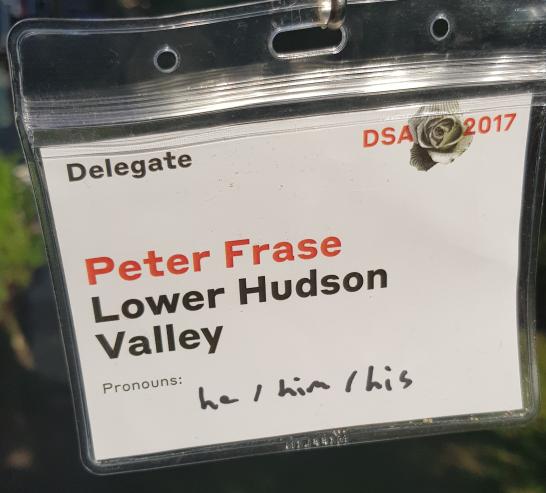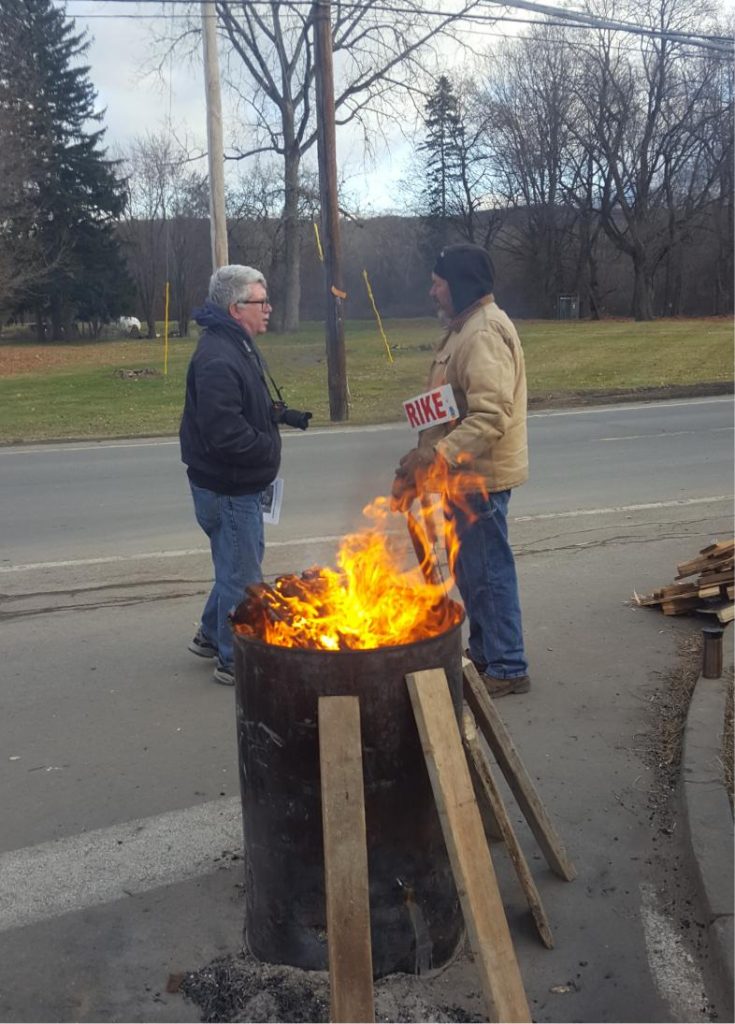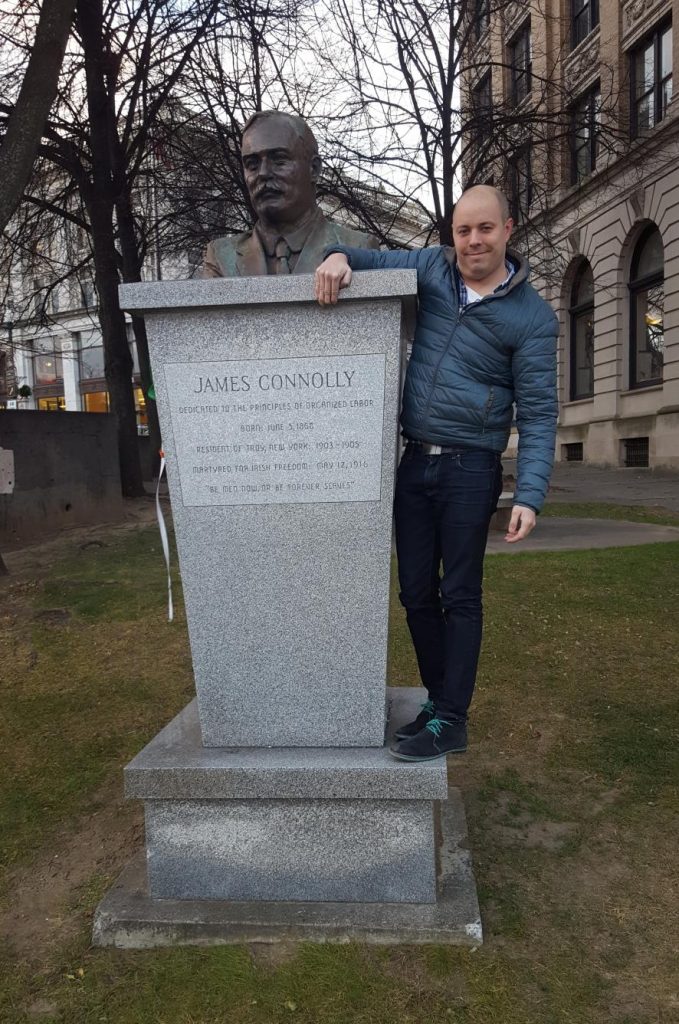DSA died so that DSA could live
August 16th, 2017 | Published in Politics, Socialism

From August 3rd to 6th, 2017, the Democratic Socialists of America held our biannual convention in Chicago. It was the 35th anniversary of the organization, which was founded in 1982 in a merger of the Democratic Socialist Organizing Committee--which in turn traced its roots to the old Socialist Party--and the New American Movement, which had a more New Left character. Many good accounts have been [written](https://newrepublic.com/article/144229/democratic-socialists-america-real) already; this is just my own personal perspective.
Unlike past conventions, this one was the subject of a good deal of media attention. That's because, after plodding along for years at around 6-8000 members, DSA has suddenly, in the past year, exploded to 25,000 dues-payers, an all-time record.
The reasons for this are many, and speak to the nature of the period, but the two crucial catalysts are easy to identify: Bernie Sanders and Donald Trump. Bernie, though he was never really a part of DSA, activated a whole layer of previously demotivated young people, and popularized "democratic socialism" as a term for something to the left of mainstream Clintonite liberalism. And after Trump won, thousands of activists, seeking a political home to continue the struggle, found DSA.
All of this was rather shocking and odd for me. On the convention's opening night, I suddenly found myself an old-timer at 37, when I spoke on the "socialism across generations" panel. Some of the other panelists were from the true old school, DSA veterans since the 1980s who organized alongside celebrity figurehead Michael Harrington. But others were from the new school, the massive influx of members who have come to the organization in the past year or so. I was there representing the somewhat forlorn middle school of DSAers.
I joined DSA in 1998, when I arrived as an undergraduate at the University of Chicago. I was already a committed Marxist, and my political sympathies tended more toward the legacy of the [New Communist Movement](https://www.marxists.org/history/erol/ncm-1/), perhaps mixed with a bit of anarchism. But I took to heart the notion that "an unorganized socialist is a contradiction in terms." So I identified DSA as the least sectarian and most politically relevant of the groups on offer; I duly walked up to their table at freshman orientation week and recruited myself.
Somehow I found myself running our campus chapter, and even becoming co-chair of the DSA youth section, the Young Democratic Socialists (now the Young Democratic Socialists of America). After college, I stayed involved intermittently, although nobody would have called me a particularly committed cadre. One of my contributions to DSA ended up being quite fortuitous for me, however: by contributing to YDS's blog, The Activist, I met its young editor, Bhaskar Sunkara. That's how I ended up on the [ground floor](https://www.jacobinmag.com/2011/01/hipsters-food-stamps-and-the-politics-of-resentment) of [Jacobin Magazine](https://jacobinmag.com/about).
Nevertheless, I had a sense that DSA was adrift, continuing on more by inertia than by any real sense of political purpose. Socialist organizations, I tend to think, have one generation to prove their relevance, before they have to give way to something else. I can hardly think of a better symbol of DSA's decrepitude, early in this century, than the increasing centrality of bequests from dead members in the organization's budgeting and fundraising.
And so it was, a decade or so ago, that I started to have the conversation with other comrades around my age: how do we let DSA die? That is, how do we acknowledge that this project has reached its terminus, without discarding the accumulated skill and knowledge of the comrades who do still have something to contribute to building 21st Century socialism?
Then the membership exploded, chapters popped up all over, and everything was uncertain. For the first time in years, I went to a DSA convention. And for the first time ever, I was an official voting delegate.
And I watched, on that August weekend in Chicago, as DSA finally *did* die, to thunderous applause. And I couldn't be happier about it.
Yes, the name and the organizational structure continue on, but what DSA is--and *who* it is--has been radically transformed in a matter of months. Of the 800 delegates in Chicago, the vast majority are newcomers to the organization. At the convention banquet, the MC asked us to stand sequentially according to the period when we had become involved in DSA or its predecessors: the 1970s, the 1980s, the 1990s, the 2000s, the early 2010s, or since the beginning of 2016. Until that very last call, almost everyone was seated.
With such an inexperienced and untested group, there was no way of knowing how anyone would react. Would they be angered or bewildered at having to debate resolutions through the arcane procedure of Robert's Rules of Order? Would some kind of wacky thing get passed as an official DSA position? Would we manage to agree on anything at all?
In the end, the assembled delegates acquitted themselves as well as I could possibly have hoped. People got the hang of the rules, votes mostly proceeded smoothly. And most importantly, the substantive decisions made were, from my point of view, almost all the right ones. And some of them would have been hard to imagine coming from the old DSA.
The two most significant--symbolically, if not necessarily in terms of DSA's practical work--were the votes to endorse Boycott, Divestment, and Sanctions (BDS) against Israel, and to leave the Socialist International.
Both of these were moves that had been repeatedly attempted in years past, with no success. The founders of DSA were by and large Zionists or at least friendly to labor Zionism, and any too-severe criticism of Israel's occupation of Palestine tended to run aground on accusations of anti-Semitism. Meanwhile, the Socialist International was taken as a mark of legitimacy and a link to those powerful social democratic parties--the French Socialist Party, the Swedish Social Democrats, among others--that an older generation of DSA took as an inspiration and a model.
But this year, despite a few vocal opponents, support for BDS and opposition to SI membership passed by what appeared to be at least 90 percent margins. Since the convention, there have been a few showy displays of horror from erstwhile democratic socialists, particularly about BDS. But these people are largely [irrelevant geezers](http://www.ericlee.info/blog/?p=1286) or [ex-Left renegades](http://www.tabletmag.com/jewish-news-and-politics/242683/disgrace-and-democratic-socialists-of-america) who would never lift a finger to build DSA in any event. Likewise with the (more muted) criticism of the SI position, which has mostly come from superannuated social democratic cosplayers, clinging to a fantasy version of the old socialist parties that is about as connected to contemporary politics as a Brezhnev-era Communist Party member's faded hopes in the USSR.
The votes we took were tremendously encouraging to me, and made me feel closer to the mainstream of DSA's politics than I ever have. We also passed a solid political priorities document, prioritizing universal health care, labor organizing, and electing socialists to office. We instituted a grievance procedure, and took some boring but incredibly important steps toward increasing our dues rate, and hence increasing our ability to hire staff and support all of our new chapters. And we elected a strong new National Political Committee, with a broad mix of ideological perspectives, and incorporating a solid core of experienced DSA veterans alongside many new faces.
(And yes, there is an ongoing controversy involving one newly elected NPC member, Danny Fetonte of Austin, who did not disclose his employment with a police union during his campaign. The NPC is engaged in an ongoing process with Fetonte, which I am still hopeful will be resolved amicably. My personal preference would be for him to resign, but for the NPC to negotiate the appointment of a replacement member who will reflect his region of the country and his ideological tendency within DSA.)
Perhaps the most encouraging thing I saw all weekend, however, was what took place during the final parliamentary session on Sunday. Throughout the convention, comrades with disabilities had become increasingly frustrated with what they felt was a lack of accessibility and acknowledgment of their issues during the proceedings. On Sunday, they decided to make a forceful intervention.
I encourage everyone to read the DSA Disability Working Group's own detailed [account](https://docs.google.com/document/d/1CylzxsZ2AfL87e4dbXA5FQzxvuuPAo39KwVjUPFRYME/edit) of what went down. But the short version is this: after attempting, and failing, to add language about disability to our national priorities document, a protest broke out. Comrades scattered through the room began chanting "nothing about us without us." At that point the chair, Chris Riddiough--who, I want to emphasize, did a heroic and indispensable job presiding throughout the rest of the convention--made the unfortunate decision to call for the removal of the protesters.
This was an *extremely* fraught moment. The protest immediately divided the room, with some delegates furious at the chair, and others furious at the protesters. I confess that I myself wavered for a moment, and I was afraid that the entire proceeding was about to devolve into chaos. But I soon realized that what was at stake, at that moment, was far more politically significant than keeping to a schedule or voting on a few remaining resolutions. This was about whether we, as the assembled delegates of DSA, were going to show some flexibility in order to affirm our solidarity with our comrades with disabilities, and by extension with all those who may find themselves marginalized or excluded in DSA.
And I'm proud to say that we passed this test. Our Robert's Rules acumen had been sharpened by days of parliamentary procedure, and someone quickly realized that we had the authority to vote to overturn the chair's ruling, which we thankfully did before there could be any question of carrying out the disastrous option of forcefully removing protesters from the hall. After that, the original motion on disability language was affirmed by huge margins, order returned, and we proceeded with the agenda. That one moment isn't sufficient to address the larger issues raised by the protesting comrades, of course. But I'm hopeful that it was a sufficient display of solidarity to avoid permanently alienating some of our most committed members.
When all was said and done, we did make it through our agenda, and we closed with a singing of the *Internationale*, in traditional socialist fashion. As well as, in more of a new school touch, breaking out into chants of "eat the rich, feed the poor" and "DSA ain't nothing to fuck with!"
And then we all went back to our chapters, where we'll take up the hard work of building up our base and taking up the day to day struggle for socialism. It remains to be seen whether the current burst of enthusiasm can be sustained, or if it was just a flash in the pan. But for now, at least, I've been convinced that the historic rebirth I've long dreamed of is a reality.
DSA is dead. Long live DSA!


